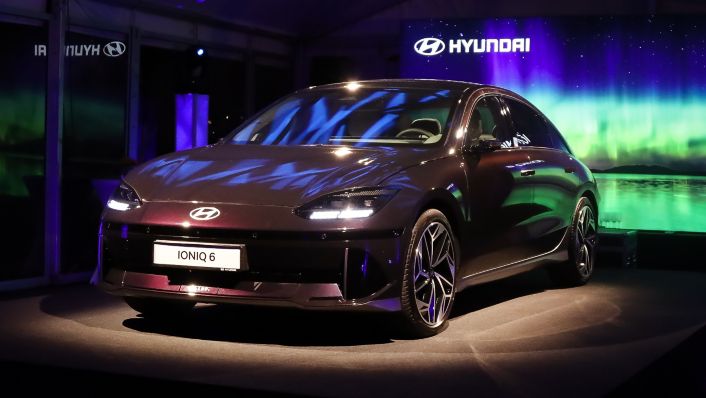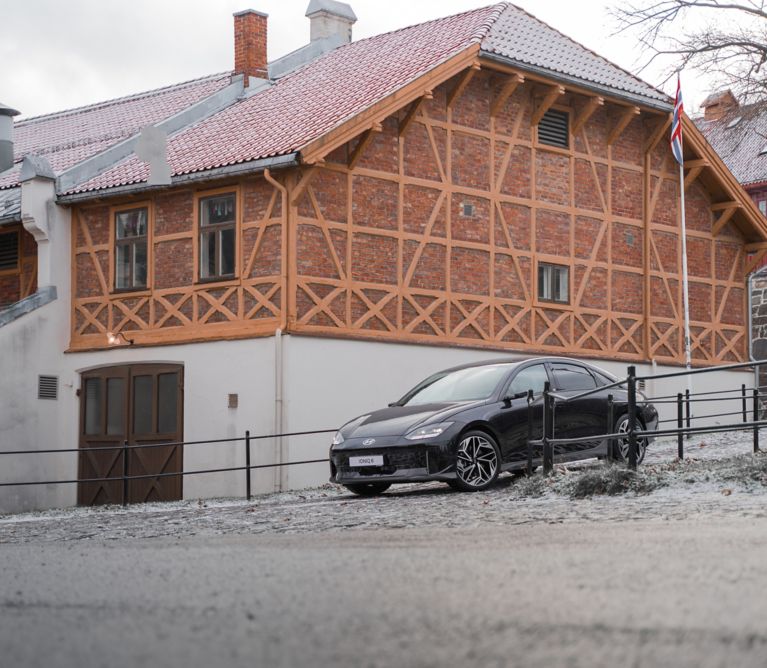- From 1 January 2023, Hyundai Motor will sell only electric cars in the Norwegian market
- Hyundai is a leader in pure electric cars, and in recent years has had an electric car share of over 90 per cent in Norway
Press material
-
Download
-
Images
Hyundai Motor Norway has today announced that the brand will sell only fully-electric zero-emission cars in the Norwegian market from 2023 onwards.
After eight years of continuous growth, Hyundai has established itself as one of the biggest automotive brands in the Norwegian market. After the introduction of the ground-breaking IONIQ lineup in 2016, its sales trajectory has headed upwards, and since then Norwegians have flocked to dealers to secure themselves a new Hyundai.
We have great faith in our model portfolio, and now that we have launched the all-new IONIQ 6, the time has come to sell only all-electric cars in the Norwegian market. IONIQ 5 and KONA Electric have long since taken positions as some of the most popular cars in the market, and we are confident that our pure electric cars will bring us continued success into the future.

© Hyundai Motor Norway
As a global leader in electrification, the Norwegian market has also proven to be a spearhead for Hyundai's electric car development. The IONIQ Electric quickly became one of the market's most popular electric cars and continued its high sales right up until the last car was delivered just before Christmas this year.
When the KONA Electric was launched in 2018, it marked a small revolution in the electric car market, with long range, an accessible price and a crossover form factor that was a hit with Norwegian and European customers alike. In Norway, this resulted in 8,000 pre-orders and sales that in recent years have meant the KONA Electric has consistently remained among the most popular cars in the country.
Since then, IONIQ 5 has arrived, also with the features, practicality and technology that customers demand. Long range, ultra-fast charging, plenty of space and a practical CUV design are all important criteria for customers, and as one of the most advanced electric cars on the market, IONIQ 5 is Norway's fifth best-selling car so far this year.
In 2020, Hyundai decided to sell only plug-in hybrid and electric cars in Norway, thanks to exciting plug-in hybrid models such as the TUCSON Plug-In Hybrid and SANTA FE Plug-In Hybrid. However, as we now enter 2023, the company is setting a new milestone in the Norwegian market.
At the end of 2022, Hyundai’s last plug-in hybrids will be sold, and from 1 January 2023, Norway will be the first market where the brand sells only pure electric cars.
Recently, we also got to see the first images of the new generation KONA Electric, and it is a model that will be both larger, more stylish and more dynamic than before. Alongside a number of other innovative models coming in the next few years, we are, in other words, primed for an all-electric future.
Hyundai has already taken electric leadership in the Norwegian market, and according to large and independent market surveys, Hyundai is the OEM that also produces fossil-fuel cars that customers most strongly associate with electric cars. It was only surpassed by two brands who produce EVs only.
Hyundai has a strong EV heritage to build on and has already delivered electric cars with market leading features, including ground-breaking efficiency, long range and innovations such as 800V ultra-fast charging, Vehicle-to-Load (V2L) and maximised roominess thanks to the dedicated Electric-Global Modular Platform (E-GMP) electric car architecture.
In 2022, Hyundai Motor Norway will have an electric car share of 93 per cent, while electric cars have consistently accounted for over 90 per cent of Hyundai’s sales in Norway in recent years. From 2020 to 2022, the brand has delivered 25,000 passenger cars in Norway, of which 92 percent are fully electric. This has given Hyundai an established position as one of Norway's most popular car brands, not only for EVs but for all drivetrains.
Disclaimer: CO2 and emissions data
- Electricity consumption combined for the Hyundai KONA Electric 39.2 kWh in kWh/100 km: 14.3; CO2 emissions combined in g/km: 0 (WLTP)
- Electricity consumption combined for the Hyundai KONA Electric 64 kWh in kWh/100 km: 14.7; CO2 emissions combined in g/km: 0 (WLTP)
- Electricity consumption combined for the Hyundai IONIQ 5 58 kWh with 2WD in kWh/100 km: 16.7; CO2 emissions combined in g/km: 0 (WLTP)
- Electricity consumption combined for the Hyundai IONIQ 5 58 kWh with 4WD in kWh/100 km: 18.1; CO2 emissions combined in g/km: 0 (WLTP)
- Electricity consumption combined for the Hyundai IONIQ 5 77.4 kWh (19” alloy rims) with 2WD in kWh/100 km: 17.0; CO2 emissions combined in g/km: 0 (WLTP)
- Electricity consumption combined for the Hyundai IONIQ 5 77.4 kWh (20” alloy rims) with 2WD in kWh/100 km: 18.0; CO2 emissions combined in g/km: 0 (WLTP)
- Electricity consumption combined for the Hyundai IONIQ 5 77.4 kWh (19” alloy rims) with 4WD in kWh/100 km: 17.9; CO2 emissions combined in g/km: 0 (WLTP)
- Electricity consumption combined for the Hyundai IONIQ 5 77.4 kWh (20” alloy rims) with 4WD in kWh/100 km: 19.1; CO2 emissions combined in g/km: 0 (WLTP)
- Electricity consumption combined for the Hyundai IONIQ 6 53 kWh with 2WD in kWh/100 km: 13.9; CO2 emissions combined in g/km: 0 (WLTP)
- Electricity consumption combined for the Hyundai IONIQ 6 77.4 kWh (18” alloy rims) with 2WD in kWh/100 km: 14.3; CO2 emissions combined in g/km: 0 (WLTP)
- Electricity consumption combined for the Hyundai IONIQ 6 77.4 kWh (20” alloy rims) with 2WD in kWh/100 km: 16.0; CO2 emissions combined in g/km: 0 (WLTP)
- Electricity consumption combined for the Hyundai IONIQ 6 77.4 kWh (18” alloy rims) with 4WD in kWh/100 km: 15.1; CO2 emissions combined in g/km: 0 (WLTP)
- Electricity consumption combined for the Hyundai IONIQ 6 77.4 kWh (20” alloy rims) with 4WD in kWh/100 km: 16.9; CO2 emissions combined in g/km: 0 (WLTP)










